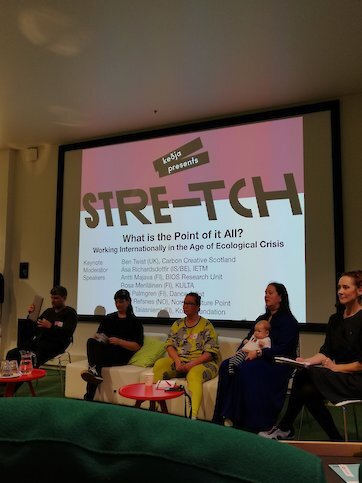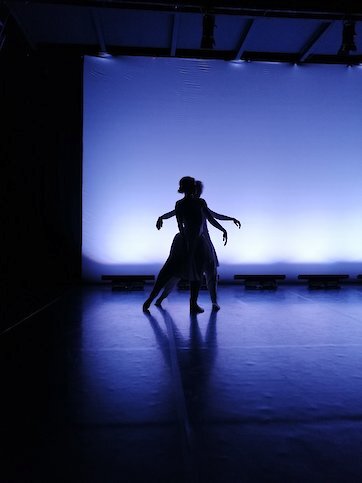The Work Room are an artist led organisation based in Glasgow. They recently supported me to travel to Turku, Finland, to attend a STRE-TCH Encounter.
STRE-TCH was an opportunity for keðja members (a platform for the Nordic-Baltic dance community) to come together to dance, share experiences and discuss how we can improve and collaborate.
The days began with a dance class, followed by Key Note speeches. These then informed the day’s topics, allowing afternoon workshops to start from this place. The key notes looked at Expanding Professionalism, System Change (Doing it together) and Working Internationally in the Ecological crisis.
I found the last key note particularly inspiring. What was even more inspiring was the opportunity for thorough discussion after it. Together we workshopped ideas and discussed solutions, that together we could help reduce our impact on today’s ever changing climate, while still striving to work collaboratively.
I had been having an internal dialogue of criticising myself for taking the flights needed to firstly get off the island, and secondly, to get all the way Finland. Slow travel was not an option to me this time due to work commitments.
However, there are solutions such as increasing support for slow travel for artists, and ensuring that when we do travel, we make our experiences worthwhile. It’s not always positive to work isolated, and meeting those of other cultures increases empathy and understanding, while being inspiring and providing opportunity for us to learn from one another. There are plus sides to face-to-face encounters, and I felt that STRE-TCH was the epiphany of that.

As a dance artist, starting the day with morning class and following it through into discussions around arts advocacy, really connected the physical and the theoretical sides to dance.
Finding solutions and discussing how we could implement them once we got home allows for the progression to continue once the encounter had finished. It felt so beneficial to hear how other organisations, from a variety of Baltic and Nordic countries, approached the work that they were doing.
I have just moved back to Shetland to begin my job as Creative Project Manager at Shetland Arts. Part of this role is support and development for artists, which is currently done through projects like the Visual Arts and Craft Makers Award.
As part of my last role I managed a residency programme. Residencies are something that as an artist, I have found incredibly beneficial, allowing me space and time to create work and providing an end goal (sharing) and opportunity to meet the local artist community in a variety of places (through artist lunches and open class). I would love to begin residencies here, however currently am not sure how best to do this, to ensure it compliments Shetland’s communities, including our artist community, while utilising our spaces and our (limited) resources.
Day 1 of STRE-TCH Encounter had a three hour long workshop ‘How to build the perfect artist residency’. Here we looked at how residency structures could be used to solve artists’ problems - however, how we must be careful as there appears to be residencies popping up all over the place. This really got me thinking, and I want to make sure we respond to need here, as opposed to implementing something because the idea of it is good.
There were many insightful people sharing their practice including artists and host organisations, such as Saari Residency and Bora Bora Dance House. It was interesting to hear their different approaches, as well as how they made them relative to the place that they were in.
We discussed the different purposes that may follow residency programmes, such as production or just space and time. Do they encourage interaction? Is this positive or negative? We discussed how residencies try to compensate for the lack of production structure and how they cannot do this. Process is important, not always product. These need to be created in keeping with policies that sustain the arts, therefore ensuring we have a long term goal for the support structures we are introducing.
It got me thinking, and as we have such excellent facilities here, I wonder if it could be that we could also look into supporting artists with a production structure. It was so great to hear so many ideas of how other companies and artists develop work, and how we can look to explore these ways here, and find what fits for us.
We spoke about how artists tend to gather in cities for a number of reasons, and looked at ways in which we can encourage artist’s livelihoods in more rural locations. Do we need to look at different ways we can celebrate different artist pathways?

I am very eager to connect Shetland Arts with the Nordic Baltic countries, and STRE-TCH and keðja really felt like the perfect way to begin building these connections.
What struck me was how welcoming the keðja network was. Everyone was happy to see us there from Scotland, and eager to meet and share a conversation. STRE-TCH was a really good size. I often feel overwhelmed at big conferences, however it was big enough to meet lots of new people, but small enough for these meetings to count. I came away with genuine connections; people we could email and still remember what their face looked like, as opposed to a sea of business cards.
STRE-TCH was well planned. The day flowed, and there was enough options for variety. There were often working groups in sessions which really encouraged sharing of good practice and gave us chance to meet one another and hear about the work that is going on, from Iceland to Lithuania!
What excited me was dance being at the centre of discussions. It explores so many multidisciplinary approaches and connects people by its very nature. It seemed the perfect art form to explore while looking at how we can expand our professionalism and connect not just to other artists or arts organisations, but to other parts of society too.
I came away feeling connected, inspired and truly believing that we can see art as a tool for activism, which in itself is a pretty big statement, but with a network such as keðja, I feel we can really work together to make this happen.
If any of this feels like something you would like to have a conversation about, please do get in touch. My email is [email protected]
